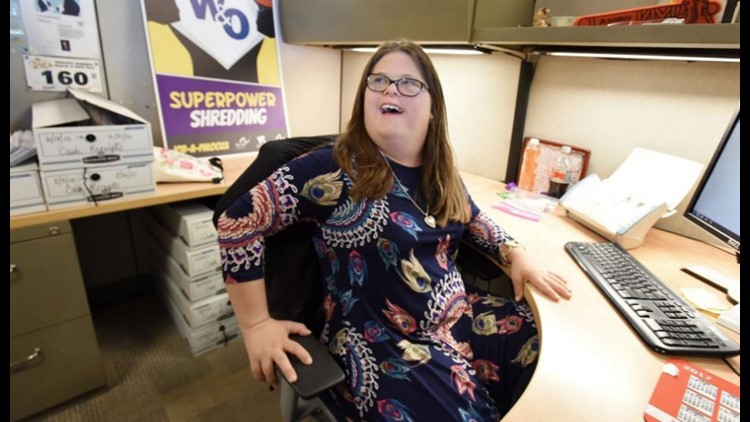JACKSONVILLE, Fla. — When Kelsey Adams and Alexa Morici were born about 30 years ago, their futures were uncertain.
They had Down syndrome, a genetic disorder typically associated with physical growth delays and mild to moderate intellectual disability.
But look at them now.
Adams, now 31, works part-time at W&O Supply, scanning and shredding documents and delivering mail. Morici, 28, works part-time as a bagger at Publix and aspires to work at Target as well. They both live independently, have lots of friends and are productive members of the community.
“I like to be who I am,” Morici said.
They are two success stories of the Down Syndrome Association of Jacksonville, which is celebrating its 30th anniversary of providing services for individuals with the condition, from birth to adult. The nonprofit has expanded its impact by relocating from a small house in Riverside to larger offices on the Southside that can accommodate more on-site programming.
This fall the association will launch Northeast Florida’s first employment training program tailored specifically to people who have Down syndrome.
“What we’ve learned is that there needs to be additional components of support,” said Debbie Revels, executive director of the association, whose son has Down syndrome. “We are not stagnant.”
The Down Syndrome Association of Jacksonville’s new location is 8011 Philips Highway, Suite 7, Jacksonville, FL 32256.To donate, volunteer or get more information, go to dsaj.org. For more information about the Career Solutions Training Academy, email Executive Director Debbie Revels at debbie.revels@dsaj.org.
The nonprofit will have a 30th-anniversary celebration — “Illuminate the Night: A Toast on the Coast” — 5 to 10 p.m. Saturday, March 30, at Atlantic Beach Country Club, 1600 Selva Marina Drive in Atlantic Beach. The event will include an auction, cocktails and dinner. Tickets are $75 for individual guests with Down Syndrome, $150 for other guests. Proceeds go to association programs, including a new employment initiative. To buy tickets or get more information, go to dsaj.org/30years.
The new Career Solutions Training Academy will build on the association’s existing employment initiatives by offering four career tracks — office, retail, restaurant and grocery — as well as professional “etiquette.”
“We are confident that this new academy will better prepare adults with Down syndrome to pursue their career goals and find meaningful employment in the community,” Revels said. “The curriculum utilizes the most effective teaching strategies for this population and incorporates individualized learning plans for our students.”
According to a survey, about 64 percent of the adults served by the association were unemployed but wanted to work, and 33 percent were employed but wanted additional hours on the job. Many individuals who have Down syndrome have had unpaid internships for years and unlike Adams and Morici haven’t experienced the accomplishment of receiving a paycheck, Revels said.
“We need to have people ready to be hired, to be successfully placed, with jobs skills, social skills,” she said.
The academy also provides support for employers who have hired or are considering hiring individuals who have Down syndrome.
Being part of the working world is a point of pride for Adams.
“I love it,” she said. “I have been there seven years now.”
“I want to do more. I want a second job,” she said.
She and Adams plan to enroll in the academy program to hone their job skills. Their mothers marveled at how far the young women have come, their levels of confidence, their blooming personalities.
“She is so dedicated. She takes her work very seriously,” said Morici’s mother, Joan Refosco. “The issue is she doesn’t get a lot of [work] hours. She is capable of a lot more.”
Susan Adams, who, with Revels, was among the five parents who founded the association, said, “It has been amazing, the growth in responsibility, paying attention.”
Refosco and Susan Adams attributed their daughters’ development in part to their involvement in association programs and joining the work force. Also critical has been the growing awareness in society and business that people with Down syndrome can handle jobs, perform multiple tasks and be quality employees.
“There has never been a better time,” Adams said.
“We have a presence now, a sense of place,” Adams said.
Beth Reese Cravey: (904) 359-4109



